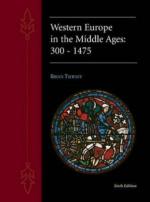|
This section contains 1,516 words (approx. 6 pages at 300 words per page) |

|
The Augustinian Model.
Although Augustine (354–430) lived during the waning decades of the Roman Empire in the West, his influence was crucial in the Middle Ages, for his work as a theologian trying to reconcile belief with reason defined a major problem that would be at the heart of philosophical pursuit for the next thousand years. It was Augustine, the great bishop of Hippo in North Africa, who established the first successful synthesis between a school of Greek philosophy (namely, Neoplatonism) and the Christian religion. A
genius of the first rank, Augustine agonized over the pursuit of truth, falling prey to several positions that he eventually rejected as false, including skepticism. Finally, when in his thirties, he was lent a copy of the treatises of the Greek philosopher and disciple of Plato, Plotinus (205–270). A new world suddenly opened to him, and...
|
This section contains 1,516 words (approx. 6 pages at 300 words per page) |

|




